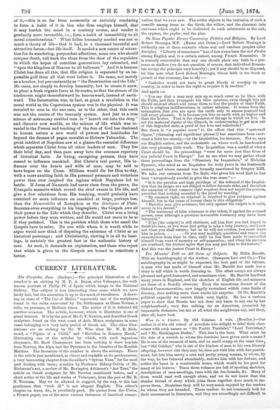disciples. "Liberty of conscience "has of late years been the
not d'ordre among English and, to a certain extent, among French Romanists. It is scarcely conceivable that any one should place any faith in a pre- tence so shallow (we do not question, of course, that individual Roman- ists accept the principle very heartily); yet if any should be so disposed, let him note what Lord Robert Montagu, whose faith is too fresh to permit of due economy, has to say :ŌĆö " Catholics would not have to grant liberty of worship in one country, in order to have the right to require it in another."
And again :ŌĆö " You say that a man may mix up as much error as he likes with the Faith, and then propagate his false opinions, even though this act should mislead others and cause them to lose the purity of their Faith. This is religions indifferentism, or rather atheism. It comes from the assumption that you are upon the earth only to amuse yourself and cull every pleasure. It is because you live on earth with no higher end than the brutes. That is the character of the age in which we live. Is not the maternal rigour of tho Church, in endeavouring to get men out of this degraded state, a proof of her love and solicitude ?"
But there is "a popular error" to the effect that this "maternal rigour," (charming and significant phrase I) has sometimes been exer- cised a little too sternly,ŌĆöby the Inquisition, for instance. Not so, says our English author, and the ecclesiastic on whose work he has founded this very pleasing little work. The Inquisition was a model of what a Court should be. Its proceedings "were far more just than those of any judicial Caurt in Europe." Let us see what we may gather about these proceedings from the "Directory for Inquisitors," of Nicholas Eymeric, who acted as an Inquisitor for forty years in the fourteenth century, and whose manual was formally sanctioned by Gregory XIII. We take our extracts from Dr. Rule, who gives his word that he has been "scrupulously careful to give the true sense" :ŌĆö "It is the peculiar and high privilege of the tribunal of the Inquisi- tion that its judges are not obliged to follow forensic rules, and therefore the omission of what common right requires does not annul the process, provided that nothing essential to the proof be wanting." "By common right, no criminal is required to give evidence against himself, but in the cause of heresy there is this obligation." "Heretics may give evidence, but only against the culprit is it valid, never in his favour."
"The testimony of false witnesses is also taken, if against the accused person, even although a previous favourable testimony may have been retracted."
"If he [the culprit] is still obstinate, tell him that you had hoped to finish his case, as you were just going to takp a long journey, and know not when you shall return ; but as he will not confess, you must leave - him in prison Or you may multiply questions and renew the examination from time to time, until he has been made to contradict himself from want of memory or self-possession; and when his answers are confused, the doctors agree that you may put him to the torture."
And this was the justest Court in Europe


































 Previous page
Previous page